Marketing in Travel and Tourism: A Case Study of Prudential Hotel
VerifiedAdded on 2020/06/04
|14
|4764
|41
Report
AI Summary
This report delves into the core concepts of marketing within the travel and tourism sector, examining key elements such as consumer behavior, market segmentation, and strategic planning. It analyzes the impact of the marketing environment, including governmental policies, economic conditions, and technological advancements, on the industry, using Prudential Hotel in Hong Kong as a case study. The report explores factors influencing consumer motivation and demand, including cultural, social, personal, and psychological influences. It highlights the importance of strategic marketing planning, marketing research, and market information for managers. Furthermore, the report discusses the product, price, and place elements of the marketing mix, along with the significance of service sector mix elements and the concept of the total tourism product. Finally, it addresses the integrated nature and role of the promotional mix, including the development of an integrated promotional campaign.
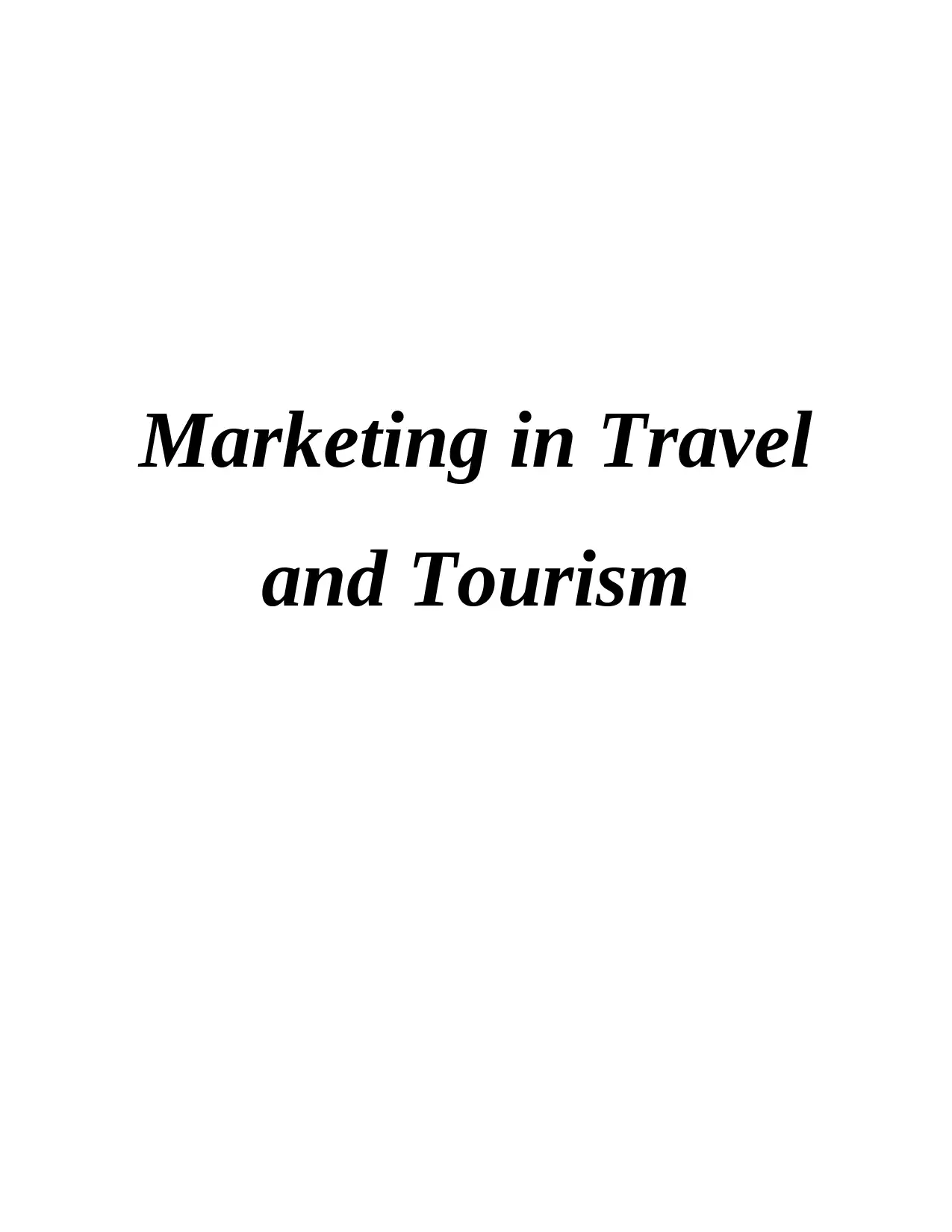
Marketing in Travel
and Tourism
and Tourism
Paraphrase This Document
Need a fresh take? Get an instant paraphrase of this document with our AI Paraphraser
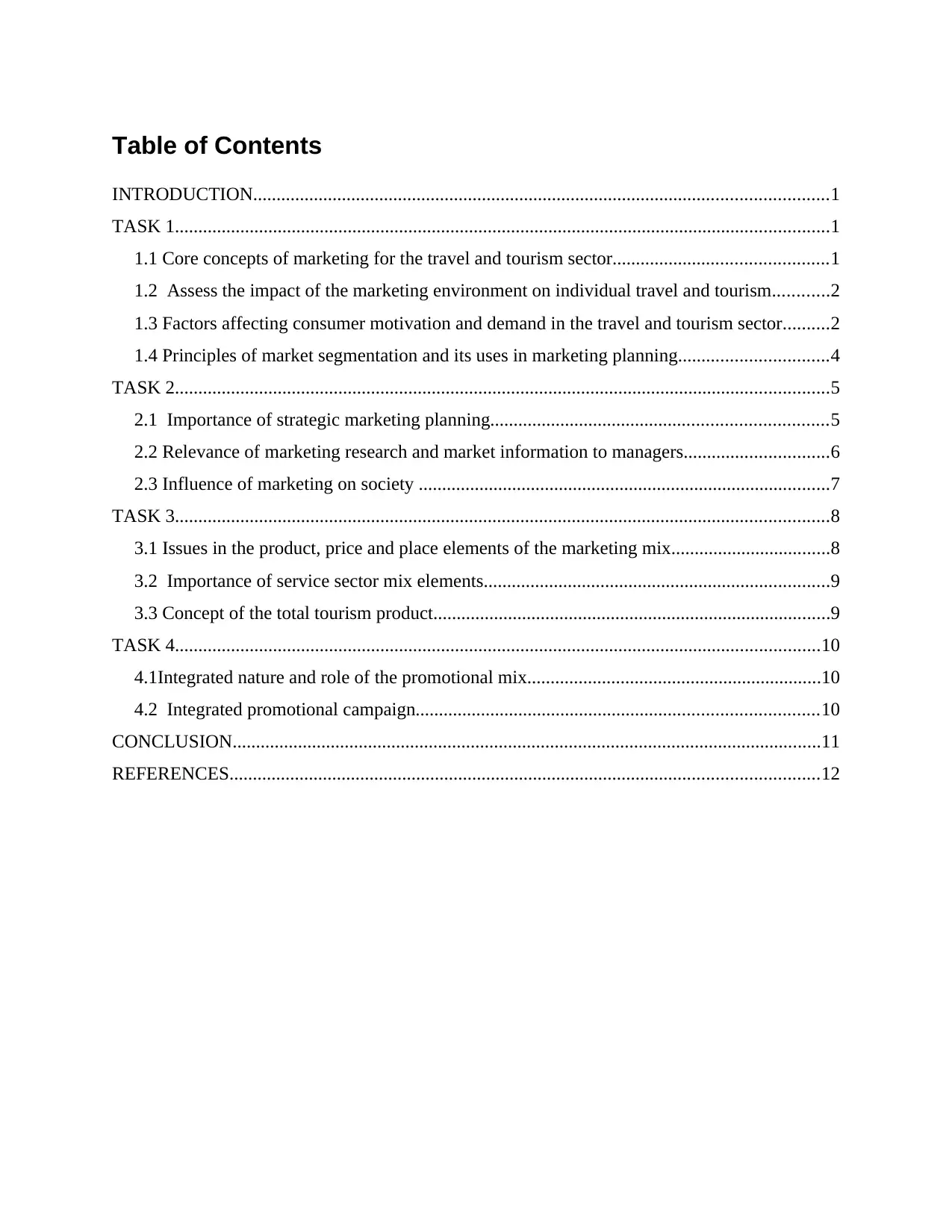
Table of Contents
INTRODUCTION...........................................................................................................................1
TASK 1............................................................................................................................................1
1.1 Core concepts of marketing for the travel and tourism sector..............................................1
1.2 Assess the impact of the marketing environment on individual travel and tourism............2
1.3 Factors affecting consumer motivation and demand in the travel and tourism sector..........2
1.4 Principles of market segmentation and its uses in marketing planning................................4
TASK 2............................................................................................................................................5
2.1 Importance of strategic marketing planning........................................................................5
2.2 Relevance of marketing research and market information to managers...............................6
2.3 Influence of marketing on society ........................................................................................7
TASK 3............................................................................................................................................8
3.1 Issues in the product, price and place elements of the marketing mix..................................8
3.2 Importance of service sector mix elements..........................................................................9
3.3 Concept of the total tourism product.....................................................................................9
TASK 4..........................................................................................................................................10
4.1Integrated nature and role of the promotional mix...............................................................10
4.2 Integrated promotional campaign......................................................................................10
CONCLUSION..............................................................................................................................11
REFERENCES..............................................................................................................................12
INTRODUCTION...........................................................................................................................1
TASK 1............................................................................................................................................1
1.1 Core concepts of marketing for the travel and tourism sector..............................................1
1.2 Assess the impact of the marketing environment on individual travel and tourism............2
1.3 Factors affecting consumer motivation and demand in the travel and tourism sector..........2
1.4 Principles of market segmentation and its uses in marketing planning................................4
TASK 2............................................................................................................................................5
2.1 Importance of strategic marketing planning........................................................................5
2.2 Relevance of marketing research and market information to managers...............................6
2.3 Influence of marketing on society ........................................................................................7
TASK 3............................................................................................................................................8
3.1 Issues in the product, price and place elements of the marketing mix..................................8
3.2 Importance of service sector mix elements..........................................................................9
3.3 Concept of the total tourism product.....................................................................................9
TASK 4..........................................................................................................................................10
4.1Integrated nature and role of the promotional mix...............................................................10
4.2 Integrated promotional campaign......................................................................................10
CONCLUSION..............................................................................................................................11
REFERENCES..............................................................................................................................12
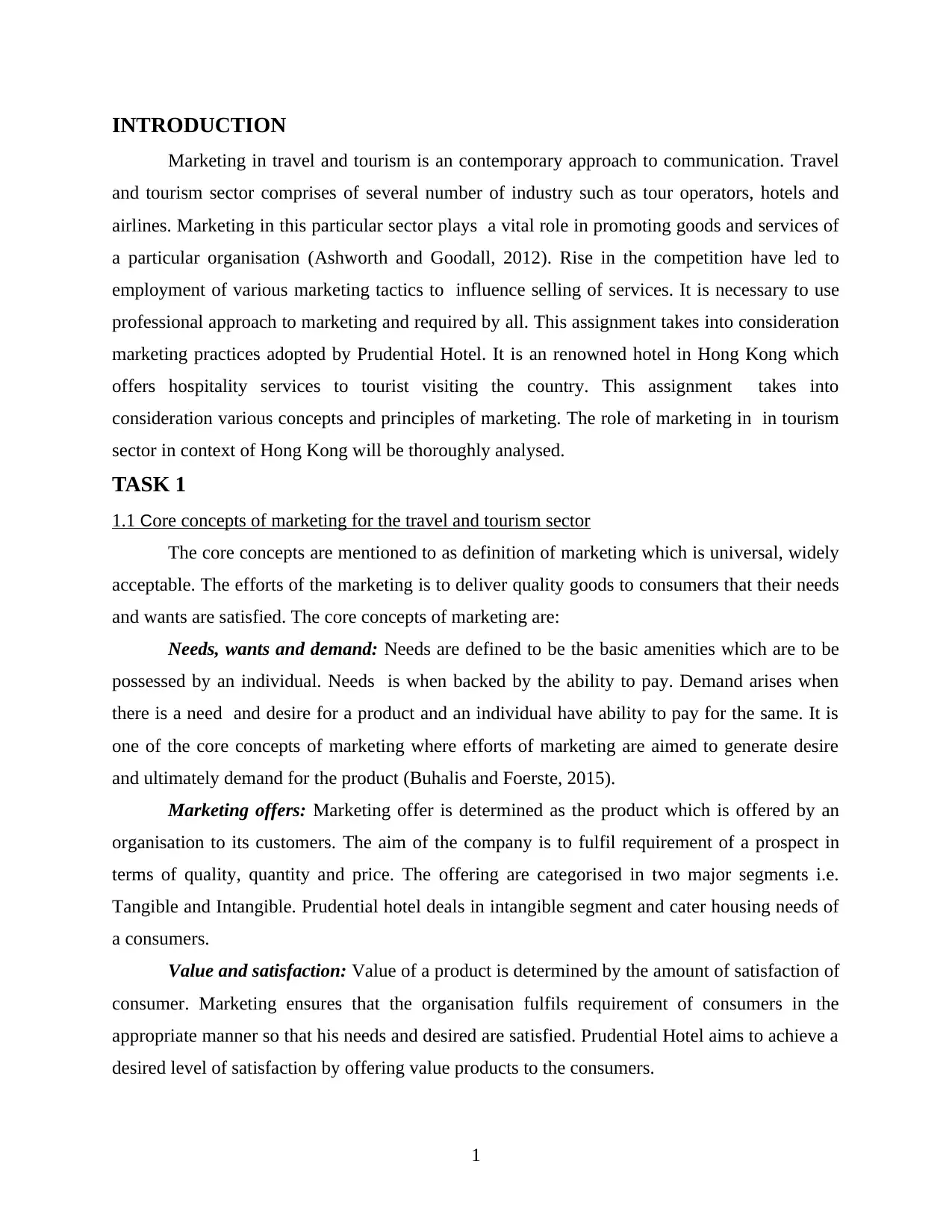
INTRODUCTION
Marketing in travel and tourism is an contemporary approach to communication. Travel
and tourism sector comprises of several number of industry such as tour operators, hotels and
airlines. Marketing in this particular sector plays a vital role in promoting goods and services of
a particular organisation (Ashworth and Goodall, 2012). Rise in the competition have led to
employment of various marketing tactics to influence selling of services. It is necessary to use
professional approach to marketing and required by all. This assignment takes into consideration
marketing practices adopted by Prudential Hotel. It is an renowned hotel in Hong Kong which
offers hospitality services to tourist visiting the country. This assignment takes into
consideration various concepts and principles of marketing. The role of marketing in in tourism
sector in context of Hong Kong will be thoroughly analysed.
TASK 1
1.1 Core concepts of marketing for the travel and tourism sector
The core concepts are mentioned to as definition of marketing which is universal, widely
acceptable. The efforts of the marketing is to deliver quality goods to consumers that their needs
and wants are satisfied. The core concepts of marketing are:
Needs, wants and demand: Needs are defined to be the basic amenities which are to be
possessed by an individual. Needs is when backed by the ability to pay. Demand arises when
there is a need and desire for a product and an individual have ability to pay for the same. It is
one of the core concepts of marketing where efforts of marketing are aimed to generate desire
and ultimately demand for the product (Buhalis and Foerste, 2015).
Marketing offers: Marketing offer is determined as the product which is offered by an
organisation to its customers. The aim of the company is to fulfil requirement of a prospect in
terms of quality, quantity and price. The offering are categorised in two major segments i.e.
Tangible and Intangible. Prudential hotel deals in intangible segment and cater housing needs of
a consumers.
Value and satisfaction: Value of a product is determined by the amount of satisfaction of
consumer. Marketing ensures that the organisation fulfils requirement of consumers in the
appropriate manner so that his needs and desired are satisfied. Prudential Hotel aims to achieve a
desired level of satisfaction by offering value products to the consumers.
1
Marketing in travel and tourism is an contemporary approach to communication. Travel
and tourism sector comprises of several number of industry such as tour operators, hotels and
airlines. Marketing in this particular sector plays a vital role in promoting goods and services of
a particular organisation (Ashworth and Goodall, 2012). Rise in the competition have led to
employment of various marketing tactics to influence selling of services. It is necessary to use
professional approach to marketing and required by all. This assignment takes into consideration
marketing practices adopted by Prudential Hotel. It is an renowned hotel in Hong Kong which
offers hospitality services to tourist visiting the country. This assignment takes into
consideration various concepts and principles of marketing. The role of marketing in in tourism
sector in context of Hong Kong will be thoroughly analysed.
TASK 1
1.1 Core concepts of marketing for the travel and tourism sector
The core concepts are mentioned to as definition of marketing which is universal, widely
acceptable. The efforts of the marketing is to deliver quality goods to consumers that their needs
and wants are satisfied. The core concepts of marketing are:
Needs, wants and demand: Needs are defined to be the basic amenities which are to be
possessed by an individual. Needs is when backed by the ability to pay. Demand arises when
there is a need and desire for a product and an individual have ability to pay for the same. It is
one of the core concepts of marketing where efforts of marketing are aimed to generate desire
and ultimately demand for the product (Buhalis and Foerste, 2015).
Marketing offers: Marketing offer is determined as the product which is offered by an
organisation to its customers. The aim of the company is to fulfil requirement of a prospect in
terms of quality, quantity and price. The offering are categorised in two major segments i.e.
Tangible and Intangible. Prudential hotel deals in intangible segment and cater housing needs of
a consumers.
Value and satisfaction: Value of a product is determined by the amount of satisfaction of
consumer. Marketing ensures that the organisation fulfils requirement of consumers in the
appropriate manner so that his needs and desired are satisfied. Prudential Hotel aims to achieve a
desired level of satisfaction by offering value products to the consumers.
1
⊘ This is a preview!⊘
Do you want full access?
Subscribe today to unlock all pages.

Trusted by 1+ million students worldwide
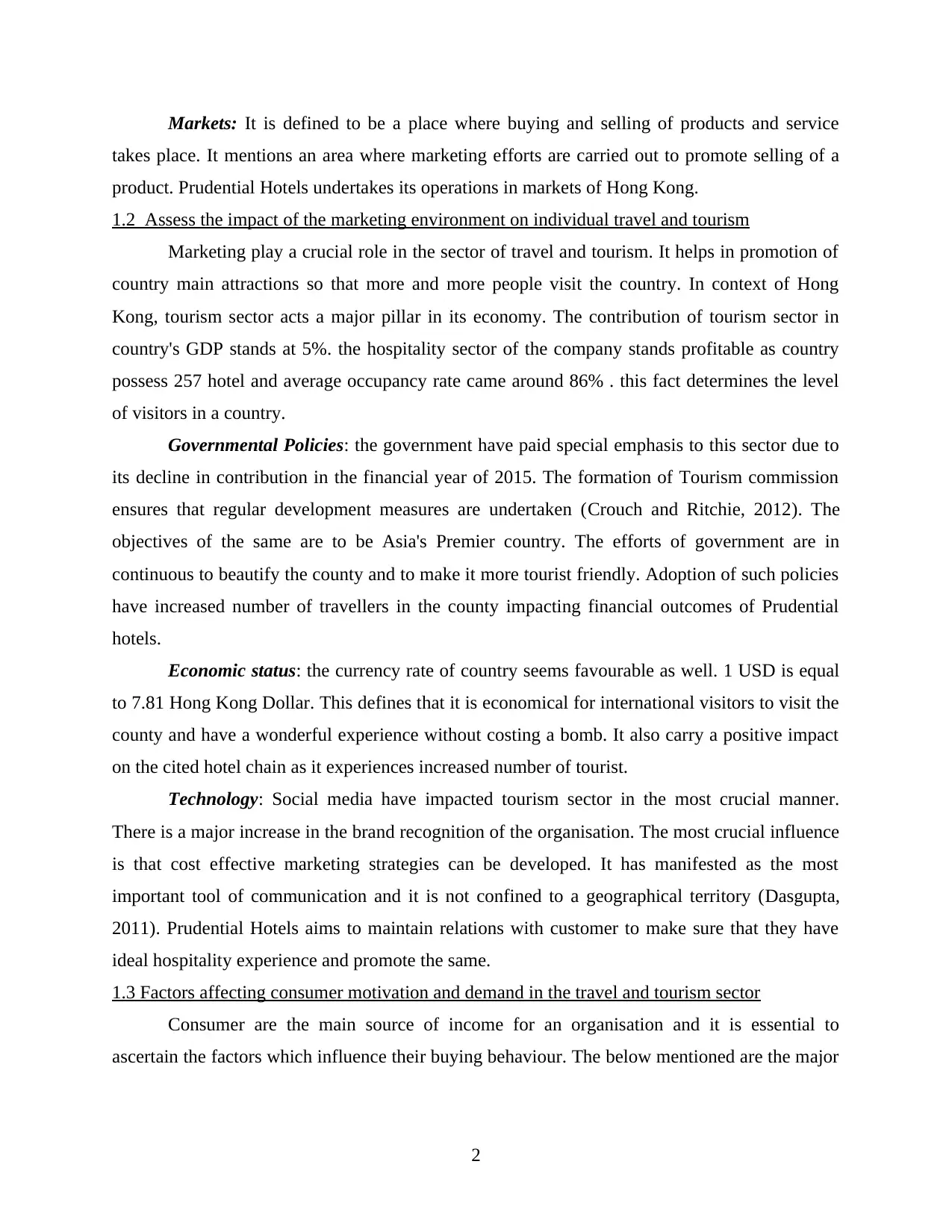
Markets: It is defined to be a place where buying and selling of products and service
takes place. It mentions an area where marketing efforts are carried out to promote selling of a
product. Prudential Hotels undertakes its operations in markets of Hong Kong.
1.2 Assess the impact of the marketing environment on individual travel and tourism
Marketing play a crucial role in the sector of travel and tourism. It helps in promotion of
country main attractions so that more and more people visit the country. In context of Hong
Kong, tourism sector acts a major pillar in its economy. The contribution of tourism sector in
country's GDP stands at 5%. the hospitality sector of the company stands profitable as country
possess 257 hotel and average occupancy rate came around 86% . this fact determines the level
of visitors in a country.
Governmental Policies: the government have paid special emphasis to this sector due to
its decline in contribution in the financial year of 2015. The formation of Tourism commission
ensures that regular development measures are undertaken (Crouch and Ritchie, 2012). The
objectives of the same are to be Asia's Premier country. The efforts of government are in
continuous to beautify the county and to make it more tourist friendly. Adoption of such policies
have increased number of travellers in the county impacting financial outcomes of Prudential
hotels.
Economic status: the currency rate of country seems favourable as well. 1 USD is equal
to 7.81 Hong Kong Dollar. This defines that it is economical for international visitors to visit the
county and have a wonderful experience without costing a bomb. It also carry a positive impact
on the cited hotel chain as it experiences increased number of tourist.
Technology: Social media have impacted tourism sector in the most crucial manner.
There is a major increase in the brand recognition of the organisation. The most crucial influence
is that cost effective marketing strategies can be developed. It has manifested as the most
important tool of communication and it is not confined to a geographical territory (Dasgupta,
2011). Prudential Hotels aims to maintain relations with customer to make sure that they have
ideal hospitality experience and promote the same.
1.3 Factors affecting consumer motivation and demand in the travel and tourism sector
Consumer are the main source of income for an organisation and it is essential to
ascertain the factors which influence their buying behaviour. The below mentioned are the major
2
takes place. It mentions an area where marketing efforts are carried out to promote selling of a
product. Prudential Hotels undertakes its operations in markets of Hong Kong.
1.2 Assess the impact of the marketing environment on individual travel and tourism
Marketing play a crucial role in the sector of travel and tourism. It helps in promotion of
country main attractions so that more and more people visit the country. In context of Hong
Kong, tourism sector acts a major pillar in its economy. The contribution of tourism sector in
country's GDP stands at 5%. the hospitality sector of the company stands profitable as country
possess 257 hotel and average occupancy rate came around 86% . this fact determines the level
of visitors in a country.
Governmental Policies: the government have paid special emphasis to this sector due to
its decline in contribution in the financial year of 2015. The formation of Tourism commission
ensures that regular development measures are undertaken (Crouch and Ritchie, 2012). The
objectives of the same are to be Asia's Premier country. The efforts of government are in
continuous to beautify the county and to make it more tourist friendly. Adoption of such policies
have increased number of travellers in the county impacting financial outcomes of Prudential
hotels.
Economic status: the currency rate of country seems favourable as well. 1 USD is equal
to 7.81 Hong Kong Dollar. This defines that it is economical for international visitors to visit the
county and have a wonderful experience without costing a bomb. It also carry a positive impact
on the cited hotel chain as it experiences increased number of tourist.
Technology: Social media have impacted tourism sector in the most crucial manner.
There is a major increase in the brand recognition of the organisation. The most crucial influence
is that cost effective marketing strategies can be developed. It has manifested as the most
important tool of communication and it is not confined to a geographical territory (Dasgupta,
2011). Prudential Hotels aims to maintain relations with customer to make sure that they have
ideal hospitality experience and promote the same.
1.3 Factors affecting consumer motivation and demand in the travel and tourism sector
Consumer are the main source of income for an organisation and it is essential to
ascertain the factors which influence their buying behaviour. The below mentioned are the major
2
Paraphrase This Document
Need a fresh take? Get an instant paraphrase of this document with our AI Paraphraser
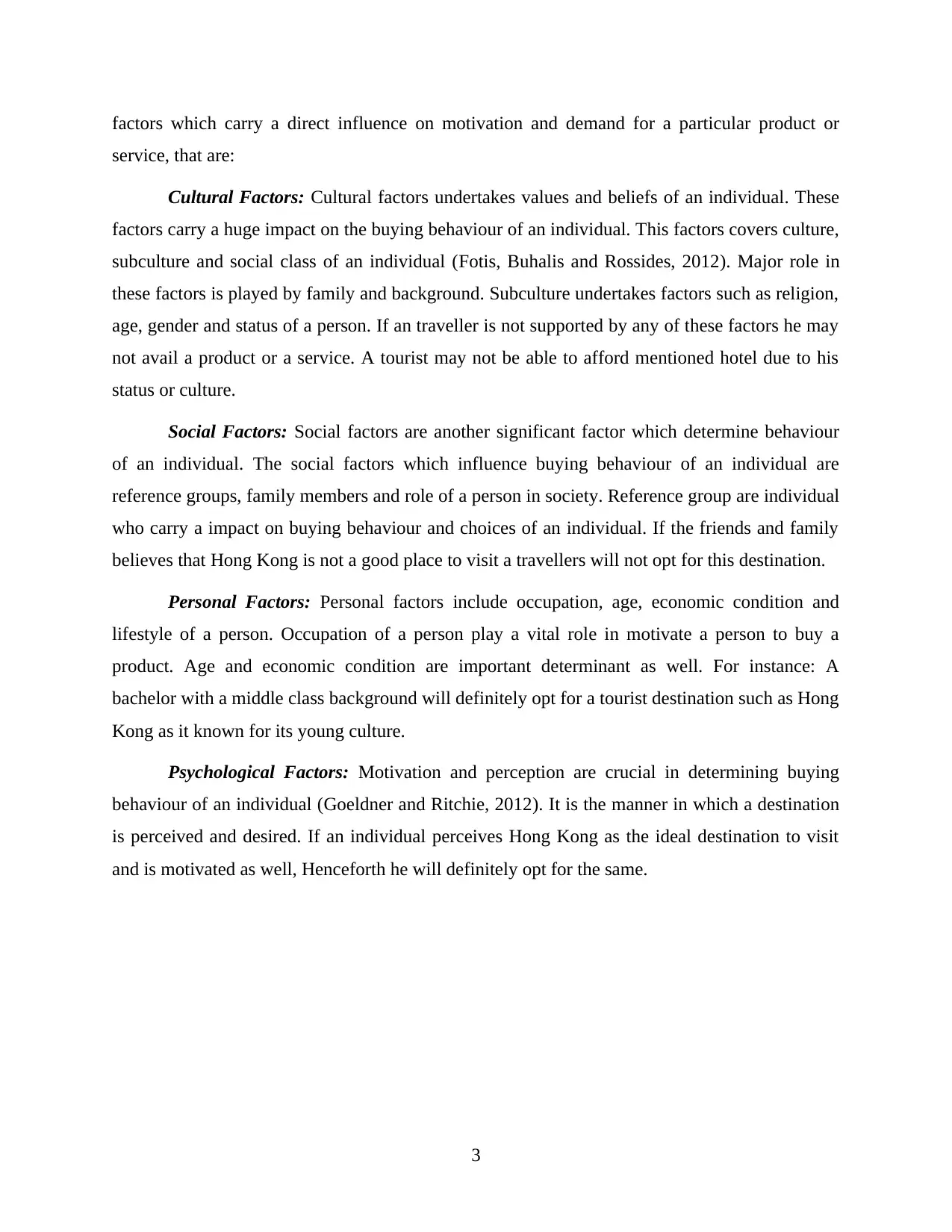
factors which carry a direct influence on motivation and demand for a particular product or
service, that are:
Cultural Factors: Cultural factors undertakes values and beliefs of an individual. These
factors carry a huge impact on the buying behaviour of an individual. This factors covers culture,
subculture and social class of an individual (Fotis, Buhalis and Rossides, 2012). Major role in
these factors is played by family and background. Subculture undertakes factors such as religion,
age, gender and status of a person. If an traveller is not supported by any of these factors he may
not avail a product or a service. A tourist may not be able to afford mentioned hotel due to his
status or culture.
Social Factors: Social factors are another significant factor which determine behaviour
of an individual. The social factors which influence buying behaviour of an individual are
reference groups, family members and role of a person in society. Reference group are individual
who carry a impact on buying behaviour and choices of an individual. If the friends and family
believes that Hong Kong is not a good place to visit a travellers will not opt for this destination.
Personal Factors: Personal factors include occupation, age, economic condition and
lifestyle of a person. Occupation of a person play a vital role in motivate a person to buy a
product. Age and economic condition are important determinant as well. For instance: A
bachelor with a middle class background will definitely opt for a tourist destination such as Hong
Kong as it known for its young culture.
Psychological Factors: Motivation and perception are crucial in determining buying
behaviour of an individual (Goeldner and Ritchie, 2012). It is the manner in which a destination
is perceived and desired. If an individual perceives Hong Kong as the ideal destination to visit
and is motivated as well, Henceforth he will definitely opt for the same.
3
service, that are:
Cultural Factors: Cultural factors undertakes values and beliefs of an individual. These
factors carry a huge impact on the buying behaviour of an individual. This factors covers culture,
subculture and social class of an individual (Fotis, Buhalis and Rossides, 2012). Major role in
these factors is played by family and background. Subculture undertakes factors such as religion,
age, gender and status of a person. If an traveller is not supported by any of these factors he may
not avail a product or a service. A tourist may not be able to afford mentioned hotel due to his
status or culture.
Social Factors: Social factors are another significant factor which determine behaviour
of an individual. The social factors which influence buying behaviour of an individual are
reference groups, family members and role of a person in society. Reference group are individual
who carry a impact on buying behaviour and choices of an individual. If the friends and family
believes that Hong Kong is not a good place to visit a travellers will not opt for this destination.
Personal Factors: Personal factors include occupation, age, economic condition and
lifestyle of a person. Occupation of a person play a vital role in motivate a person to buy a
product. Age and economic condition are important determinant as well. For instance: A
bachelor with a middle class background will definitely opt for a tourist destination such as Hong
Kong as it known for its young culture.
Psychological Factors: Motivation and perception are crucial in determining buying
behaviour of an individual (Goeldner and Ritchie, 2012). It is the manner in which a destination
is perceived and desired. If an individual perceives Hong Kong as the ideal destination to visit
and is motivated as well, Henceforth he will definitely opt for the same.
3
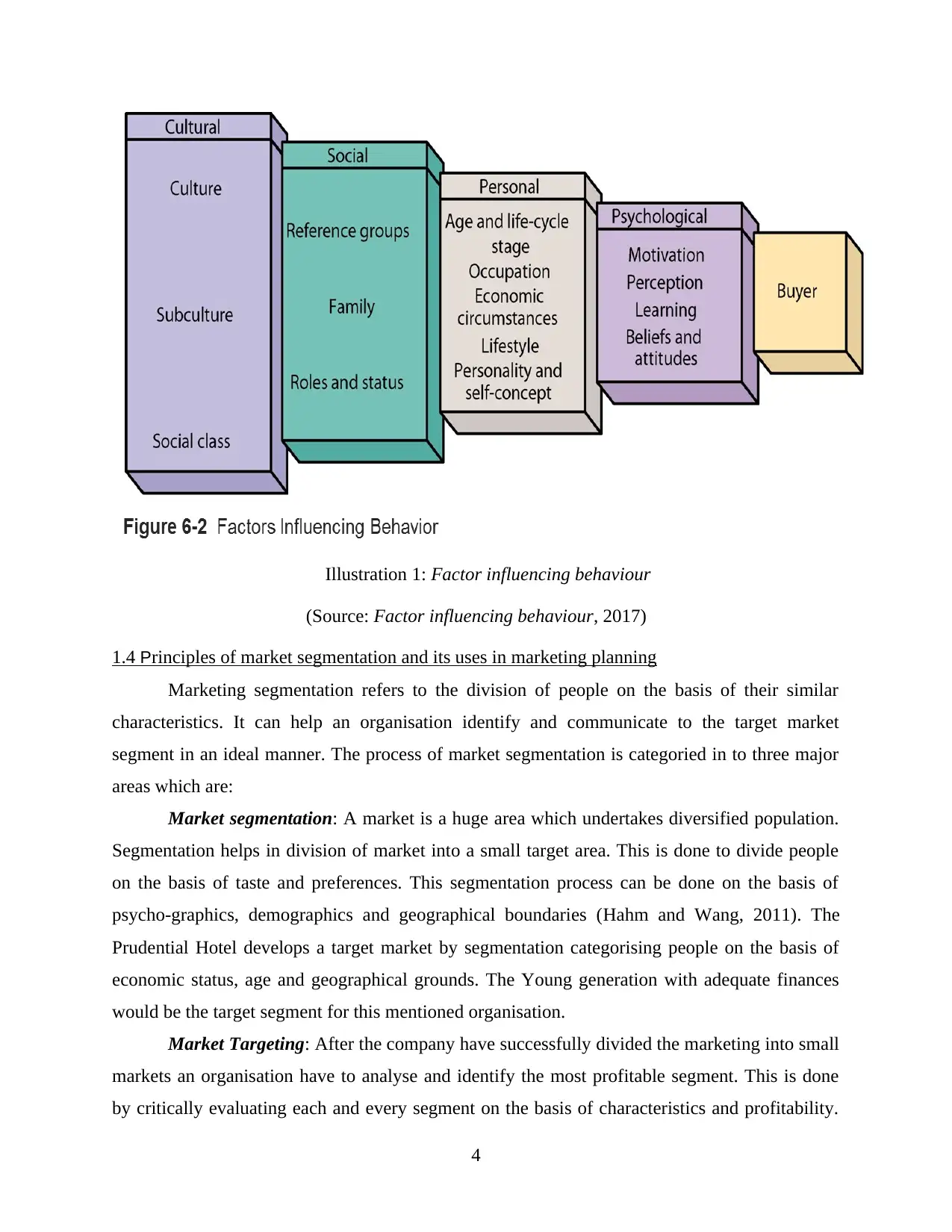
Illustration 1: Factor influencing behaviour
(Source: Factor influencing behaviour, 2017)
1.4 Principles of market segmentation and its uses in marketing planning
Marketing segmentation refers to the division of people on the basis of their similar
characteristics. It can help an organisation identify and communicate to the target market
segment in an ideal manner. The process of market segmentation is categoried in to three major
areas which are:
Market segmentation: A market is a huge area which undertakes diversified population.
Segmentation helps in division of market into a small target area. This is done to divide people
on the basis of taste and preferences. This segmentation process can be done on the basis of
psycho-graphics, demographics and geographical boundaries (Hahm and Wang, 2011). The
Prudential Hotel develops a target market by segmentation categorising people on the basis of
economic status, age and geographical grounds. The Young generation with adequate finances
would be the target segment for this mentioned organisation.
Market Targeting: After the company have successfully divided the marketing into small
markets an organisation have to analyse and identify the most profitable segment. This is done
by critically evaluating each and every segment on the basis of characteristics and profitability.
4
(Source: Factor influencing behaviour, 2017)
1.4 Principles of market segmentation and its uses in marketing planning
Marketing segmentation refers to the division of people on the basis of their similar
characteristics. It can help an organisation identify and communicate to the target market
segment in an ideal manner. The process of market segmentation is categoried in to three major
areas which are:
Market segmentation: A market is a huge area which undertakes diversified population.
Segmentation helps in division of market into a small target area. This is done to divide people
on the basis of taste and preferences. This segmentation process can be done on the basis of
psycho-graphics, demographics and geographical boundaries (Hahm and Wang, 2011). The
Prudential Hotel develops a target market by segmentation categorising people on the basis of
economic status, age and geographical grounds. The Young generation with adequate finances
would be the target segment for this mentioned organisation.
Market Targeting: After the company have successfully divided the marketing into small
markets an organisation have to analyse and identify the most profitable segment. This is done
by critically evaluating each and every segment on the basis of characteristics and profitability.
4
⊘ This is a preview!⊘
Do you want full access?
Subscribe today to unlock all pages.

Trusted by 1+ million students worldwide
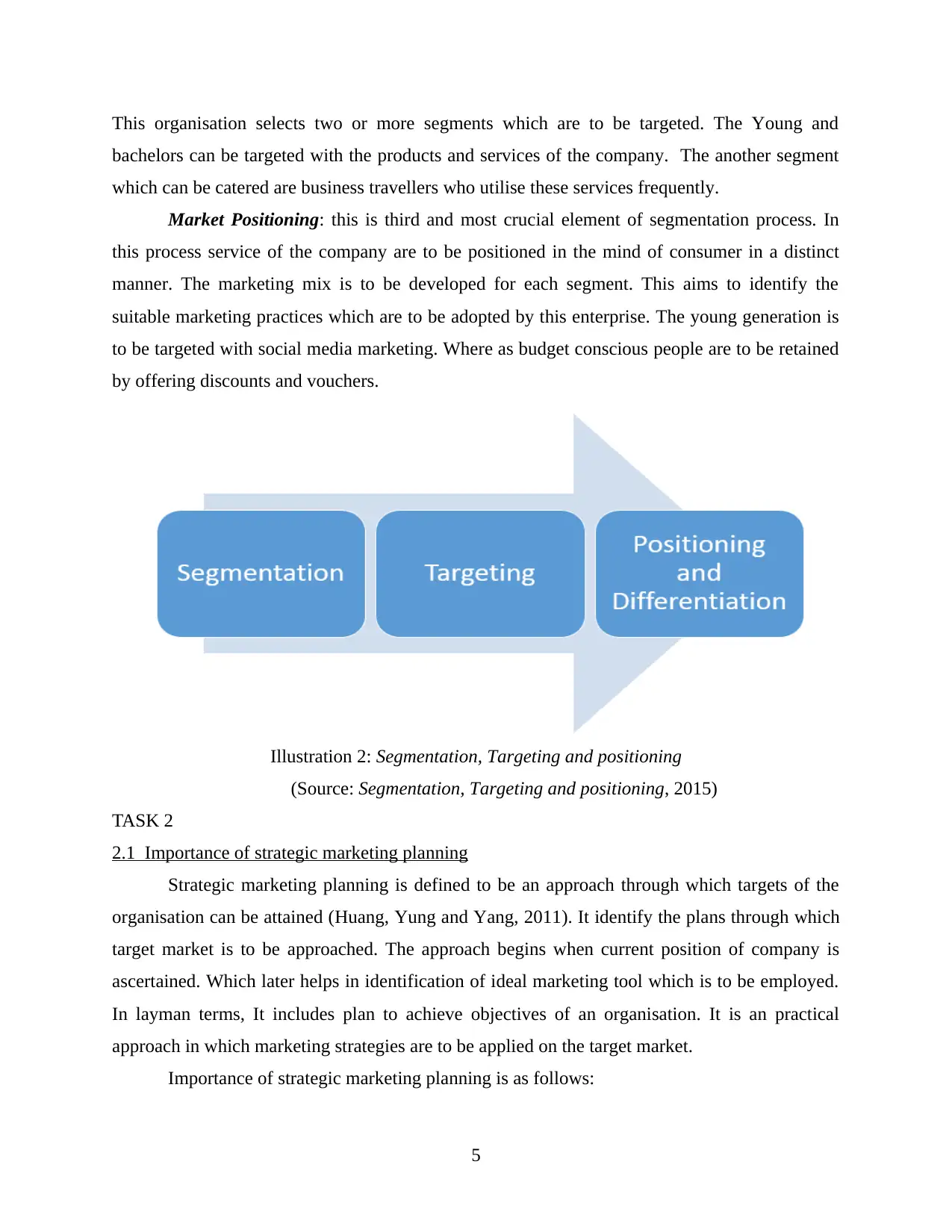
This organisation selects two or more segments which are to be targeted. The Young and
bachelors can be targeted with the products and services of the company. The another segment
which can be catered are business travellers who utilise these services frequently.
Market Positioning: this is third and most crucial element of segmentation process. In
this process service of the company are to be positioned in the mind of consumer in a distinct
manner. The marketing mix is to be developed for each segment. This aims to identify the
suitable marketing practices which are to be adopted by this enterprise. The young generation is
to be targeted with social media marketing. Where as budget conscious people are to be retained
by offering discounts and vouchers.
(Source: Segmentation, Targeting and positioning, 2015)
TASK 2
2.1 Importance of strategic marketing planning
Strategic marketing planning is defined to be an approach through which targets of the
organisation can be attained (Huang, Yung and Yang, 2011). It identify the plans through which
target market is to be approached. The approach begins when current position of company is
ascertained. Which later helps in identification of ideal marketing tool which is to be employed.
In layman terms, It includes plan to achieve objectives of an organisation. It is an practical
approach in which marketing strategies are to be applied on the target market.
Importance of strategic marketing planning is as follows:
5
Illustration 2: Segmentation, Targeting and positioning
bachelors can be targeted with the products and services of the company. The another segment
which can be catered are business travellers who utilise these services frequently.
Market Positioning: this is third and most crucial element of segmentation process. In
this process service of the company are to be positioned in the mind of consumer in a distinct
manner. The marketing mix is to be developed for each segment. This aims to identify the
suitable marketing practices which are to be adopted by this enterprise. The young generation is
to be targeted with social media marketing. Where as budget conscious people are to be retained
by offering discounts and vouchers.
(Source: Segmentation, Targeting and positioning, 2015)
TASK 2
2.1 Importance of strategic marketing planning
Strategic marketing planning is defined to be an approach through which targets of the
organisation can be attained (Huang, Yung and Yang, 2011). It identify the plans through which
target market is to be approached. The approach begins when current position of company is
ascertained. Which later helps in identification of ideal marketing tool which is to be employed.
In layman terms, It includes plan to achieve objectives of an organisation. It is an practical
approach in which marketing strategies are to be applied on the target market.
Importance of strategic marketing planning is as follows:
5
Illustration 2: Segmentation, Targeting and positioning
Paraphrase This Document
Need a fresh take? Get an instant paraphrase of this document with our AI Paraphraser
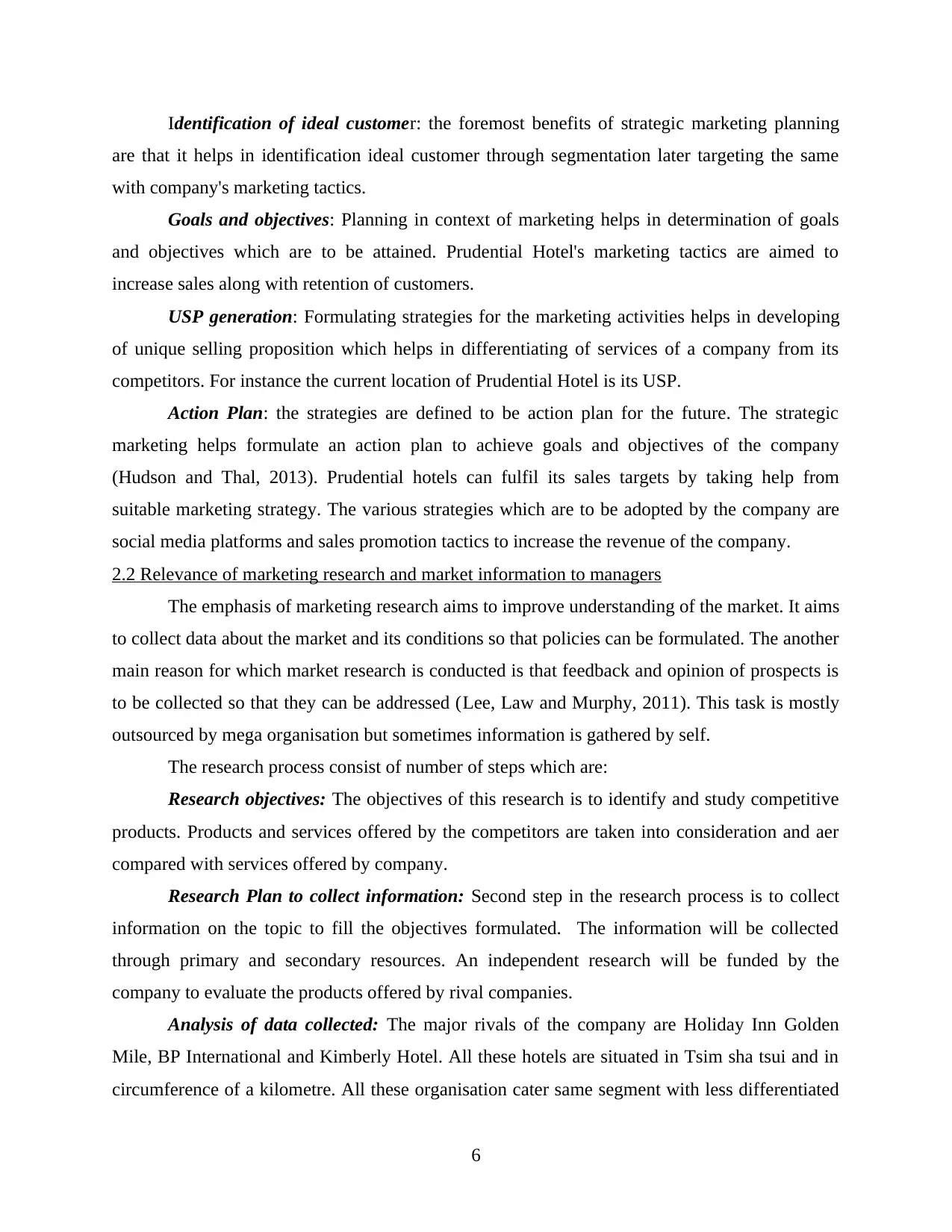
Identification of ideal customer: the foremost benefits of strategic marketing planning
are that it helps in identification ideal customer through segmentation later targeting the same
with company's marketing tactics.
Goals and objectives: Planning in context of marketing helps in determination of goals
and objectives which are to be attained. Prudential Hotel's marketing tactics are aimed to
increase sales along with retention of customers.
USP generation: Formulating strategies for the marketing activities helps in developing
of unique selling proposition which helps in differentiating of services of a company from its
competitors. For instance the current location of Prudential Hotel is its USP.
Action Plan: the strategies are defined to be action plan for the future. The strategic
marketing helps formulate an action plan to achieve goals and objectives of the company
(Hudson and Thal, 2013). Prudential hotels can fulfil its sales targets by taking help from
suitable marketing strategy. The various strategies which are to be adopted by the company are
social media platforms and sales promotion tactics to increase the revenue of the company.
2.2 Relevance of marketing research and market information to managers
The emphasis of marketing research aims to improve understanding of the market. It aims
to collect data about the market and its conditions so that policies can be formulated. The another
main reason for which market research is conducted is that feedback and opinion of prospects is
to be collected so that they can be addressed (Lee, Law and Murphy, 2011). This task is mostly
outsourced by mega organisation but sometimes information is gathered by self.
The research process consist of number of steps which are:
Research objectives: The objectives of this research is to identify and study competitive
products. Products and services offered by the competitors are taken into consideration and aer
compared with services offered by company.
Research Plan to collect information: Second step in the research process is to collect
information on the topic to fill the objectives formulated. The information will be collected
through primary and secondary resources. An independent research will be funded by the
company to evaluate the products offered by rival companies.
Analysis of data collected: The major rivals of the company are Holiday Inn Golden
Mile, BP International and Kimberly Hotel. All these hotels are situated in Tsim sha tsui and in
circumference of a kilometre. All these organisation cater same segment with less differentiated
6
are that it helps in identification ideal customer through segmentation later targeting the same
with company's marketing tactics.
Goals and objectives: Planning in context of marketing helps in determination of goals
and objectives which are to be attained. Prudential Hotel's marketing tactics are aimed to
increase sales along with retention of customers.
USP generation: Formulating strategies for the marketing activities helps in developing
of unique selling proposition which helps in differentiating of services of a company from its
competitors. For instance the current location of Prudential Hotel is its USP.
Action Plan: the strategies are defined to be action plan for the future. The strategic
marketing helps formulate an action plan to achieve goals and objectives of the company
(Hudson and Thal, 2013). Prudential hotels can fulfil its sales targets by taking help from
suitable marketing strategy. The various strategies which are to be adopted by the company are
social media platforms and sales promotion tactics to increase the revenue of the company.
2.2 Relevance of marketing research and market information to managers
The emphasis of marketing research aims to improve understanding of the market. It aims
to collect data about the market and its conditions so that policies can be formulated. The another
main reason for which market research is conducted is that feedback and opinion of prospects is
to be collected so that they can be addressed (Lee, Law and Murphy, 2011). This task is mostly
outsourced by mega organisation but sometimes information is gathered by self.
The research process consist of number of steps which are:
Research objectives: The objectives of this research is to identify and study competitive
products. Products and services offered by the competitors are taken into consideration and aer
compared with services offered by company.
Research Plan to collect information: Second step in the research process is to collect
information on the topic to fill the objectives formulated. The information will be collected
through primary and secondary resources. An independent research will be funded by the
company to evaluate the products offered by rival companies.
Analysis of data collected: The major rivals of the company are Holiday Inn Golden
Mile, BP International and Kimberly Hotel. All these hotels are situated in Tsim sha tsui and in
circumference of a kilometre. All these organisation cater same segment with less differentiated
6
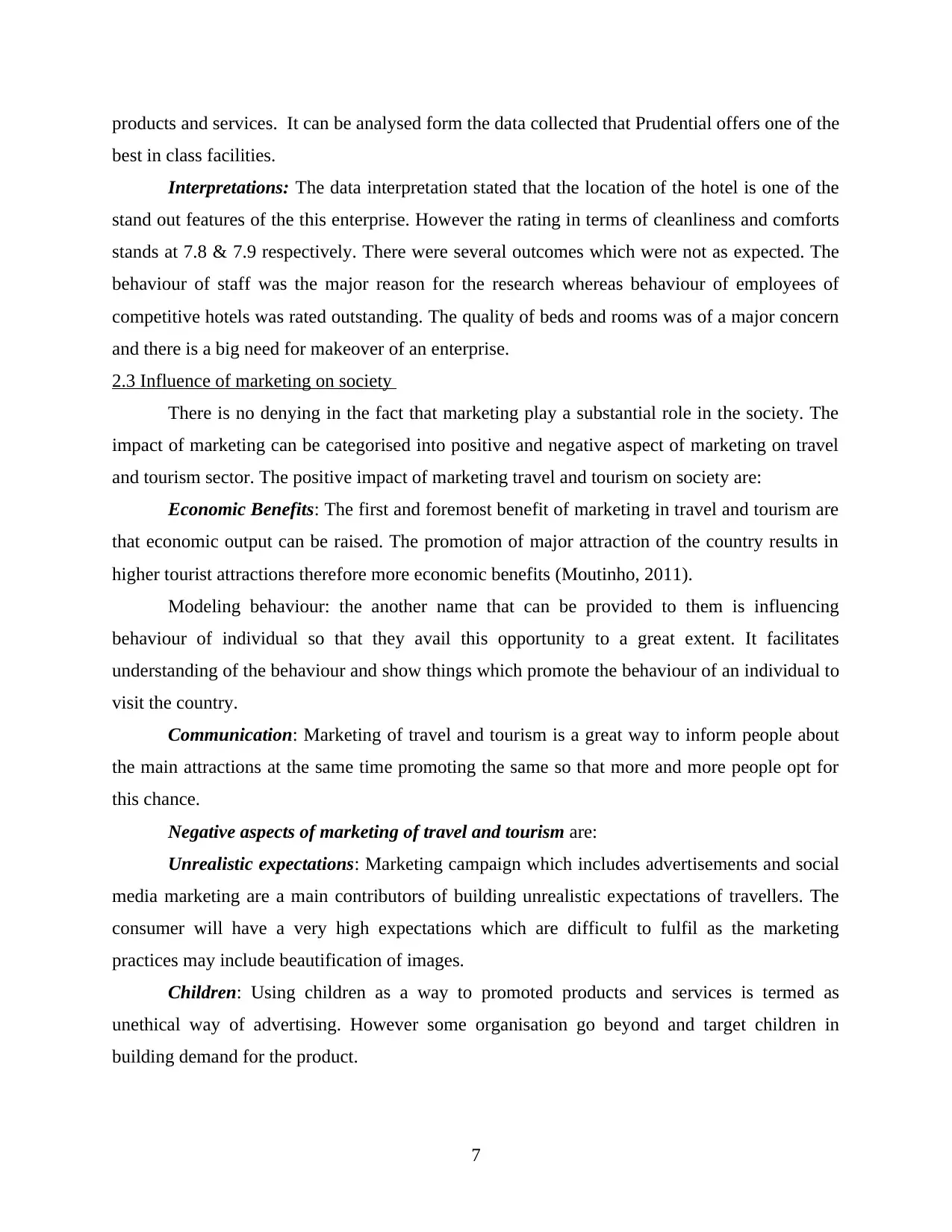
products and services. It can be analysed form the data collected that Prudential offers one of the
best in class facilities.
Interpretations: The data interpretation stated that the location of the hotel is one of the
stand out features of the this enterprise. However the rating in terms of cleanliness and comforts
stands at 7.8 & 7.9 respectively. There were several outcomes which were not as expected. The
behaviour of staff was the major reason for the research whereas behaviour of employees of
competitive hotels was rated outstanding. The quality of beds and rooms was of a major concern
and there is a big need for makeover of an enterprise.
2.3 Influence of marketing on society
There is no denying in the fact that marketing play a substantial role in the society. The
impact of marketing can be categorised into positive and negative aspect of marketing on travel
and tourism sector. The positive impact of marketing travel and tourism on society are:
Economic Benefits: The first and foremost benefit of marketing in travel and tourism are
that economic output can be raised. The promotion of major attraction of the country results in
higher tourist attractions therefore more economic benefits (Moutinho, 2011).
Modeling behaviour: the another name that can be provided to them is influencing
behaviour of individual so that they avail this opportunity to a great extent. It facilitates
understanding of the behaviour and show things which promote the behaviour of an individual to
visit the country.
Communication: Marketing of travel and tourism is a great way to inform people about
the main attractions at the same time promoting the same so that more and more people opt for
this chance.
Negative aspects of marketing of travel and tourism are:
Unrealistic expectations: Marketing campaign which includes advertisements and social
media marketing are a main contributors of building unrealistic expectations of travellers. The
consumer will have a very high expectations which are difficult to fulfil as the marketing
practices may include beautification of images.
Children: Using children as a way to promoted products and services is termed as
unethical way of advertising. However some organisation go beyond and target children in
building demand for the product.
7
best in class facilities.
Interpretations: The data interpretation stated that the location of the hotel is one of the
stand out features of the this enterprise. However the rating in terms of cleanliness and comforts
stands at 7.8 & 7.9 respectively. There were several outcomes which were not as expected. The
behaviour of staff was the major reason for the research whereas behaviour of employees of
competitive hotels was rated outstanding. The quality of beds and rooms was of a major concern
and there is a big need for makeover of an enterprise.
2.3 Influence of marketing on society
There is no denying in the fact that marketing play a substantial role in the society. The
impact of marketing can be categorised into positive and negative aspect of marketing on travel
and tourism sector. The positive impact of marketing travel and tourism on society are:
Economic Benefits: The first and foremost benefit of marketing in travel and tourism are
that economic output can be raised. The promotion of major attraction of the country results in
higher tourist attractions therefore more economic benefits (Moutinho, 2011).
Modeling behaviour: the another name that can be provided to them is influencing
behaviour of individual so that they avail this opportunity to a great extent. It facilitates
understanding of the behaviour and show things which promote the behaviour of an individual to
visit the country.
Communication: Marketing of travel and tourism is a great way to inform people about
the main attractions at the same time promoting the same so that more and more people opt for
this chance.
Negative aspects of marketing of travel and tourism are:
Unrealistic expectations: Marketing campaign which includes advertisements and social
media marketing are a main contributors of building unrealistic expectations of travellers. The
consumer will have a very high expectations which are difficult to fulfil as the marketing
practices may include beautification of images.
Children: Using children as a way to promoted products and services is termed as
unethical way of advertising. However some organisation go beyond and target children in
building demand for the product.
7
⊘ This is a preview!⊘
Do you want full access?
Subscribe today to unlock all pages.

Trusted by 1+ million students worldwide
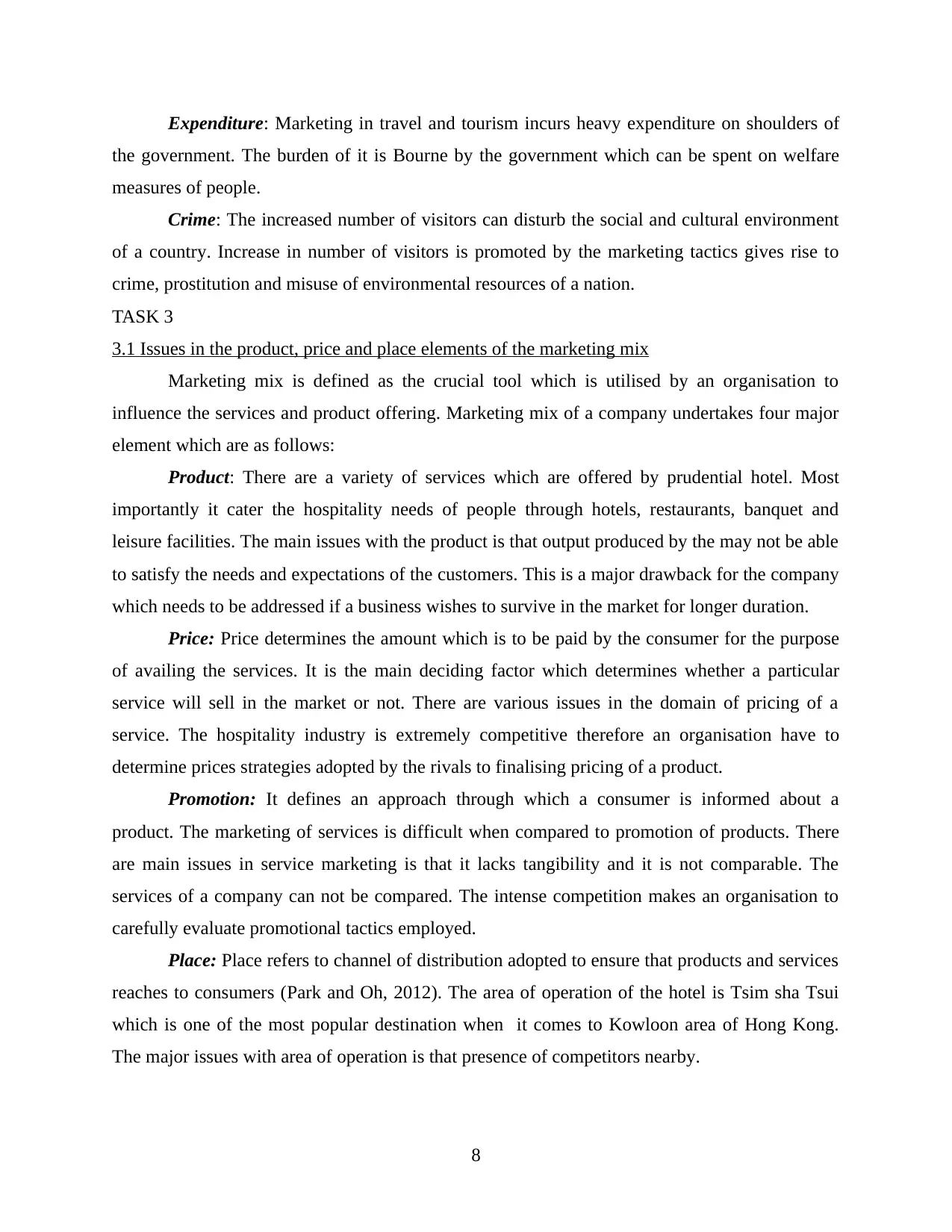
Expenditure: Marketing in travel and tourism incurs heavy expenditure on shoulders of
the government. The burden of it is Bourne by the government which can be spent on welfare
measures of people.
Crime: The increased number of visitors can disturb the social and cultural environment
of a country. Increase in number of visitors is promoted by the marketing tactics gives rise to
crime, prostitution and misuse of environmental resources of a nation.
TASK 3
3.1 Issues in the product, price and place elements of the marketing mix
Marketing mix is defined as the crucial tool which is utilised by an organisation to
influence the services and product offering. Marketing mix of a company undertakes four major
element which are as follows:
Product: There are a variety of services which are offered by prudential hotel. Most
importantly it cater the hospitality needs of people through hotels, restaurants, banquet and
leisure facilities. The main issues with the product is that output produced by the may not be able
to satisfy the needs and expectations of the customers. This is a major drawback for the company
which needs to be addressed if a business wishes to survive in the market for longer duration.
Price: Price determines the amount which is to be paid by the consumer for the purpose
of availing the services. It is the main deciding factor which determines whether a particular
service will sell in the market or not. There are various issues in the domain of pricing of a
service. The hospitality industry is extremely competitive therefore an organisation have to
determine prices strategies adopted by the rivals to finalising pricing of a product.
Promotion: It defines an approach through which a consumer is informed about a
product. The marketing of services is difficult when compared to promotion of products. There
are main issues in service marketing is that it lacks tangibility and it is not comparable. The
services of a company can not be compared. The intense competition makes an organisation to
carefully evaluate promotional tactics employed.
Place: Place refers to channel of distribution adopted to ensure that products and services
reaches to consumers (Park and Oh, 2012). The area of operation of the hotel is Tsim sha Tsui
which is one of the most popular destination when it comes to Kowloon area of Hong Kong.
The major issues with area of operation is that presence of competitors nearby.
8
the government. The burden of it is Bourne by the government which can be spent on welfare
measures of people.
Crime: The increased number of visitors can disturb the social and cultural environment
of a country. Increase in number of visitors is promoted by the marketing tactics gives rise to
crime, prostitution and misuse of environmental resources of a nation.
TASK 3
3.1 Issues in the product, price and place elements of the marketing mix
Marketing mix is defined as the crucial tool which is utilised by an organisation to
influence the services and product offering. Marketing mix of a company undertakes four major
element which are as follows:
Product: There are a variety of services which are offered by prudential hotel. Most
importantly it cater the hospitality needs of people through hotels, restaurants, banquet and
leisure facilities. The main issues with the product is that output produced by the may not be able
to satisfy the needs and expectations of the customers. This is a major drawback for the company
which needs to be addressed if a business wishes to survive in the market for longer duration.
Price: Price determines the amount which is to be paid by the consumer for the purpose
of availing the services. It is the main deciding factor which determines whether a particular
service will sell in the market or not. There are various issues in the domain of pricing of a
service. The hospitality industry is extremely competitive therefore an organisation have to
determine prices strategies adopted by the rivals to finalising pricing of a product.
Promotion: It defines an approach through which a consumer is informed about a
product. The marketing of services is difficult when compared to promotion of products. There
are main issues in service marketing is that it lacks tangibility and it is not comparable. The
services of a company can not be compared. The intense competition makes an organisation to
carefully evaluate promotional tactics employed.
Place: Place refers to channel of distribution adopted to ensure that products and services
reaches to consumers (Park and Oh, 2012). The area of operation of the hotel is Tsim sha Tsui
which is one of the most popular destination when it comes to Kowloon area of Hong Kong.
The major issues with area of operation is that presence of competitors nearby.
8
Paraphrase This Document
Need a fresh take? Get an instant paraphrase of this document with our AI Paraphraser
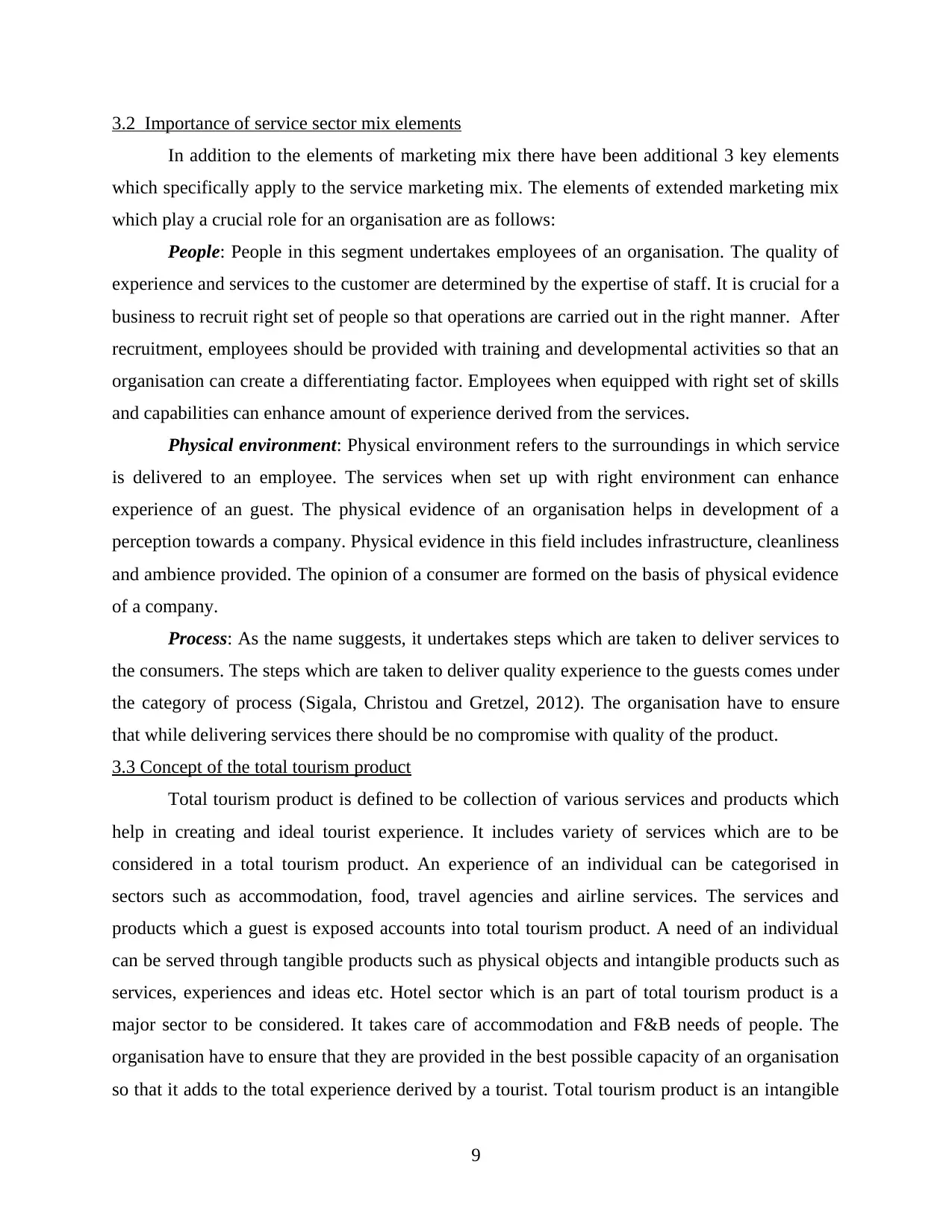
3.2 Importance of service sector mix elements
In addition to the elements of marketing mix there have been additional 3 key elements
which specifically apply to the service marketing mix. The elements of extended marketing mix
which play a crucial role for an organisation are as follows:
People: People in this segment undertakes employees of an organisation. The quality of
experience and services to the customer are determined by the expertise of staff. It is crucial for a
business to recruit right set of people so that operations are carried out in the right manner. After
recruitment, employees should be provided with training and developmental activities so that an
organisation can create a differentiating factor. Employees when equipped with right set of skills
and capabilities can enhance amount of experience derived from the services.
Physical environment: Physical environment refers to the surroundings in which service
is delivered to an employee. The services when set up with right environment can enhance
experience of an guest. The physical evidence of an organisation helps in development of a
perception towards a company. Physical evidence in this field includes infrastructure, cleanliness
and ambience provided. The opinion of a consumer are formed on the basis of physical evidence
of a company.
Process: As the name suggests, it undertakes steps which are taken to deliver services to
the consumers. The steps which are taken to deliver quality experience to the guests comes under
the category of process (Sigala, Christou and Gretzel, 2012). The organisation have to ensure
that while delivering services there should be no compromise with quality of the product.
3.3 Concept of the total tourism product
Total tourism product is defined to be collection of various services and products which
help in creating and ideal tourist experience. It includes variety of services which are to be
considered in a total tourism product. An experience of an individual can be categorised in
sectors such as accommodation, food, travel agencies and airline services. The services and
products which a guest is exposed accounts into total tourism product. A need of an individual
can be served through tangible products such as physical objects and intangible products such as
services, experiences and ideas etc. Hotel sector which is an part of total tourism product is a
major sector to be considered. It takes care of accommodation and F&B needs of people. The
organisation have to ensure that they are provided in the best possible capacity of an organisation
so that it adds to the total experience derived by a tourist. Total tourism product is an intangible
9
In addition to the elements of marketing mix there have been additional 3 key elements
which specifically apply to the service marketing mix. The elements of extended marketing mix
which play a crucial role for an organisation are as follows:
People: People in this segment undertakes employees of an organisation. The quality of
experience and services to the customer are determined by the expertise of staff. It is crucial for a
business to recruit right set of people so that operations are carried out in the right manner. After
recruitment, employees should be provided with training and developmental activities so that an
organisation can create a differentiating factor. Employees when equipped with right set of skills
and capabilities can enhance amount of experience derived from the services.
Physical environment: Physical environment refers to the surroundings in which service
is delivered to an employee. The services when set up with right environment can enhance
experience of an guest. The physical evidence of an organisation helps in development of a
perception towards a company. Physical evidence in this field includes infrastructure, cleanliness
and ambience provided. The opinion of a consumer are formed on the basis of physical evidence
of a company.
Process: As the name suggests, it undertakes steps which are taken to deliver services to
the consumers. The steps which are taken to deliver quality experience to the guests comes under
the category of process (Sigala, Christou and Gretzel, 2012). The organisation have to ensure
that while delivering services there should be no compromise with quality of the product.
3.3 Concept of the total tourism product
Total tourism product is defined to be collection of various services and products which
help in creating and ideal tourist experience. It includes variety of services which are to be
considered in a total tourism product. An experience of an individual can be categorised in
sectors such as accommodation, food, travel agencies and airline services. The services and
products which a guest is exposed accounts into total tourism product. A need of an individual
can be served through tangible products such as physical objects and intangible products such as
services, experiences and ideas etc. Hotel sector which is an part of total tourism product is a
major sector to be considered. It takes care of accommodation and F&B needs of people. The
organisation have to ensure that they are provided in the best possible capacity of an organisation
so that it adds to the total experience derived by a tourist. Total tourism product is an intangible
9
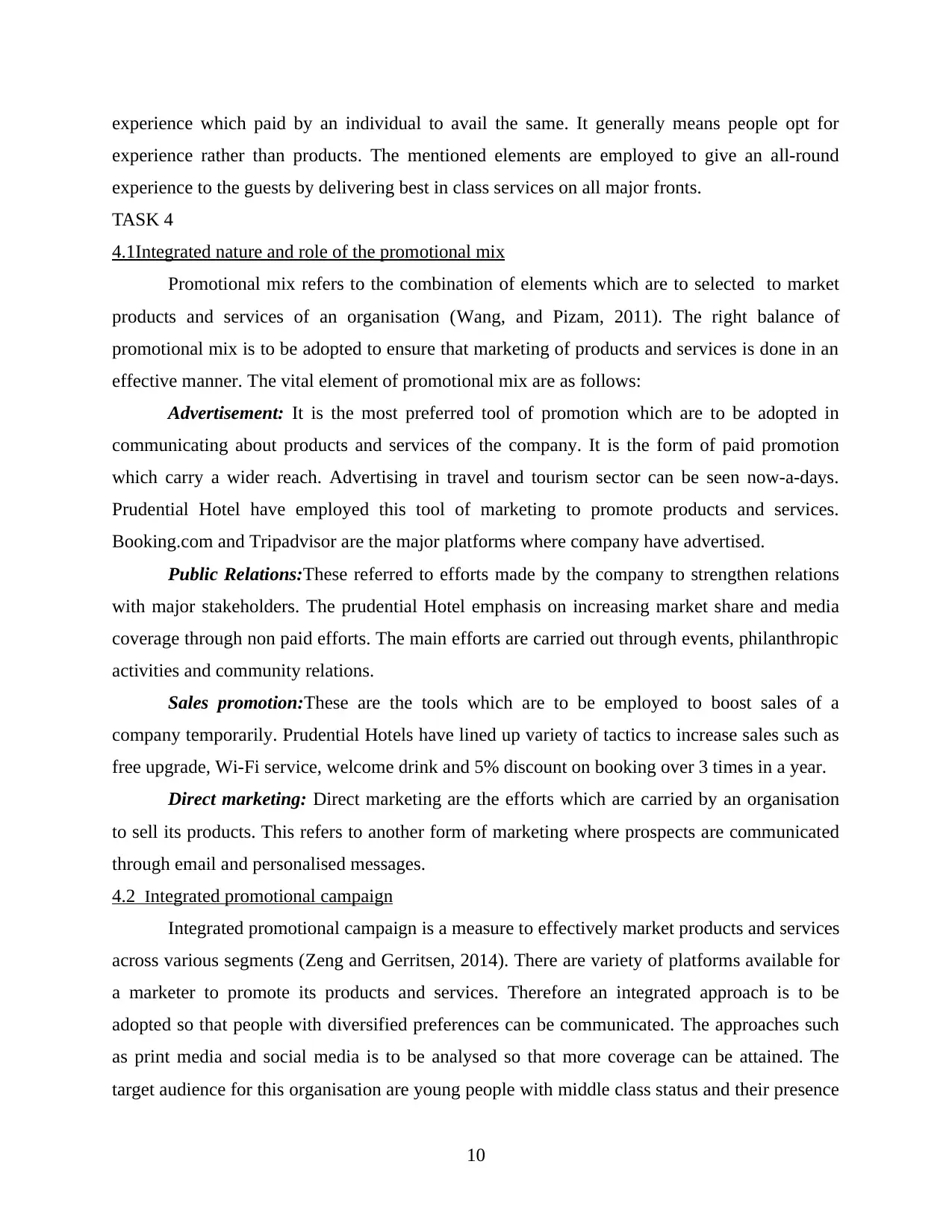
experience which paid by an individual to avail the same. It generally means people opt for
experience rather than products. The mentioned elements are employed to give an all-round
experience to the guests by delivering best in class services on all major fronts.
TASK 4
4.1Integrated nature and role of the promotional mix
Promotional mix refers to the combination of elements which are to selected to market
products and services of an organisation (Wang, and Pizam, 2011). The right balance of
promotional mix is to be adopted to ensure that marketing of products and services is done in an
effective manner. The vital element of promotional mix are as follows:
Advertisement: It is the most preferred tool of promotion which are to be adopted in
communicating about products and services of the company. It is the form of paid promotion
which carry a wider reach. Advertising in travel and tourism sector can be seen now-a-days.
Prudential Hotel have employed this tool of marketing to promote products and services.
Booking.com and Tripadvisor are the major platforms where company have advertised.
Public Relations:These referred to efforts made by the company to strengthen relations
with major stakeholders. The prudential Hotel emphasis on increasing market share and media
coverage through non paid efforts. The main efforts are carried out through events, philanthropic
activities and community relations.
Sales promotion:These are the tools which are to be employed to boost sales of a
company temporarily. Prudential Hotels have lined up variety of tactics to increase sales such as
free upgrade, Wi-Fi service, welcome drink and 5% discount on booking over 3 times in a year.
Direct marketing: Direct marketing are the efforts which are carried by an organisation
to sell its products. This refers to another form of marketing where prospects are communicated
through email and personalised messages.
4.2 Integrated promotional campaign
Integrated promotional campaign is a measure to effectively market products and services
across various segments (Zeng and Gerritsen, 2014). There are variety of platforms available for
a marketer to promote its products and services. Therefore an integrated approach is to be
adopted so that people with diversified preferences can be communicated. The approaches such
as print media and social media is to be analysed so that more coverage can be attained. The
target audience for this organisation are young people with middle class status and their presence
10
experience rather than products. The mentioned elements are employed to give an all-round
experience to the guests by delivering best in class services on all major fronts.
TASK 4
4.1Integrated nature and role of the promotional mix
Promotional mix refers to the combination of elements which are to selected to market
products and services of an organisation (Wang, and Pizam, 2011). The right balance of
promotional mix is to be adopted to ensure that marketing of products and services is done in an
effective manner. The vital element of promotional mix are as follows:
Advertisement: It is the most preferred tool of promotion which are to be adopted in
communicating about products and services of the company. It is the form of paid promotion
which carry a wider reach. Advertising in travel and tourism sector can be seen now-a-days.
Prudential Hotel have employed this tool of marketing to promote products and services.
Booking.com and Tripadvisor are the major platforms where company have advertised.
Public Relations:These referred to efforts made by the company to strengthen relations
with major stakeholders. The prudential Hotel emphasis on increasing market share and media
coverage through non paid efforts. The main efforts are carried out through events, philanthropic
activities and community relations.
Sales promotion:These are the tools which are to be employed to boost sales of a
company temporarily. Prudential Hotels have lined up variety of tactics to increase sales such as
free upgrade, Wi-Fi service, welcome drink and 5% discount on booking over 3 times in a year.
Direct marketing: Direct marketing are the efforts which are carried by an organisation
to sell its products. This refers to another form of marketing where prospects are communicated
through email and personalised messages.
4.2 Integrated promotional campaign
Integrated promotional campaign is a measure to effectively market products and services
across various segments (Zeng and Gerritsen, 2014). There are variety of platforms available for
a marketer to promote its products and services. Therefore an integrated approach is to be
adopted so that people with diversified preferences can be communicated. The approaches such
as print media and social media is to be analysed so that more coverage can be attained. The
target audience for this organisation are young people with middle class status and their presence
10
⊘ This is a preview!⊘
Do you want full access?
Subscribe today to unlock all pages.

Trusted by 1+ million students worldwide
1 out of 14
Related Documents
Your All-in-One AI-Powered Toolkit for Academic Success.
+13062052269
info@desklib.com
Available 24*7 on WhatsApp / Email
![[object Object]](/_next/static/media/star-bottom.7253800d.svg)
Unlock your academic potential
Copyright © 2020–2025 A2Z Services. All Rights Reserved. Developed and managed by ZUCOL.





